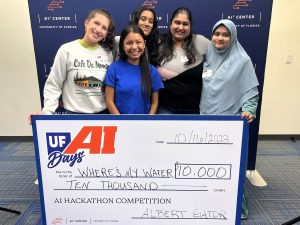With a mix of coding, artificial intelligence, and soil, water, and ecosystem sciences, the all-female team behind “Where’s My Water!” secured the top spot in the University of Florida AI Days Hackathon competition. The team’s winning project addresses groundwater depletion but also marks a significant step towards breaking barriers in fields where women are often underrepresented.
“By showcasing our skills in computing, artificial intelligence, and science, we hope to inspire a new generation of women to explore and contribute to these transformative fields,” said Tanya Charan, a fourth-year soil, water, and ecosystem sciences major with a concentration in water science.
“Where’s My Water!” is an online web application designed to address the issue of groundwater depletion and uses generative AI. It visualizes and predicts trends in groundwater in the United States by utilizing U.S. Geological Survey (USGS) groundwater data.
Teamwork

Charan helped with finding and cleaning the data for the project. She also wrote the machine learning algorithm that trains the model to recognize patterns in groundwater depletion.
The other team members are computer science majors Aayesha Islam, Gabriella Smith, and Naydelin Trejo. Shravya Sama is majoring in data science. All five are members of Girls Who Code at UF. Together, they worked on everything from the user experience and integrating the data into the website to coding the entire project.
“Where’s My Water!” first prompts the user to visualize a lake or well that is under groundwater depletion. It then generates the image for them to understand one of the major effects of this problem.
“We hope that allowing users to visualize groundwater depletion for the surface water bodies they’re familiar with will show them how serious the issue is,” Charan explained.
The second aspect is the groundwater future prediction dashboard. A user can choose a year and U.S. state to see the expected groundwater levels for it.
James Jawitz, professor of landscape hydrology in the UF/IFAS department of soil, water, and ecosystem sciences, said more than 90% of Floridians rely on groundwater for their water supply. He points out that this is an important issue for the state, but also a national and global issue.
“Around the United States and around the world the security of groundwater resources is emerging as a critical factor in urban sustainability,” Jawitz explained. “I’m very proud to see how Tanya has merged her knowledge of groundwater issues with her passion for computer science.”
Research and Development
“Where’s My Water!” celebrates filling a void in the industry, according to the team. The five members conducted extensive research before embarking on their project. They discovered a lack of initiatives combining soil, water, and ecosystem sciences with computing and artificial intelligence. Their solution sparks a conversation about the necessity of interdisciplinary collaboration to benefit both people and the planet.
The team’s journey to the AI Days Hackathon was marked by swift adaptation and learning. In the face of challenges posed by new technologies like Google Colab, Tensorflow, and Earth Engine, they showed resilience and a rapid learning curve.
“I think our ability to figure these programs out and problem-solve together definitely highlights our technical skills,” Charan said. “It also shows we have the communications skills, people skills, and the ability to overcome obstacles to achieve our goal.”
She credits Dr. Raquel Dias, assistant professor of microbiology and cell science, with teaching her the technical aspects of the project. Dias teaches the course ALS 3200C – AI in Agricultural and Life Sciences.
“The team did an excellent job leveraging artificial intelligence and data science to propose a very promising solution to tackle this relevant challenge,” Dias said. “Groundwater is a critical resource for drinking water, agriculture, and ecosystems. It’s also vulnerable to the impacts of pollution and climate change.”
Looking Ahead
The team aims to continue refining its model for greater accuracy. They also want to expand their dataset to include more states. By collaborating with the USGS, they plan to increase the number of reporting sites across the United States.
As the winners of the UF AI Days Hackathon, “Where’s My Water!” is an example of diversity, innovation, and a commitment to addressing critical environmental issues. The team’s achievements go beyond the competition, setting the stage for future projects that advance technology and science.
More information on the project, including a video explanation, is here: https://devpost.com/software/where-s-my-water-apgu2q?ref_content=my-projects-tab&ref_feature=my_projects
 5
5
